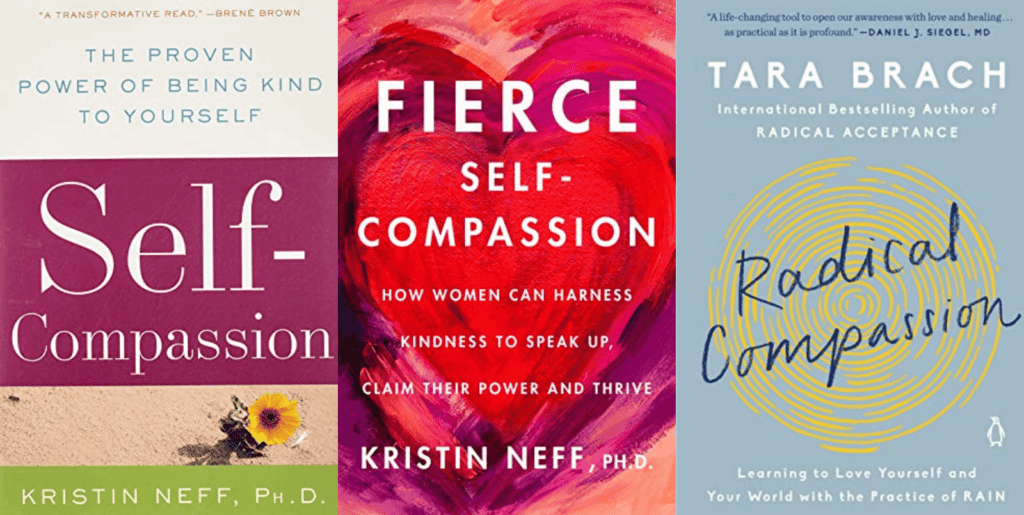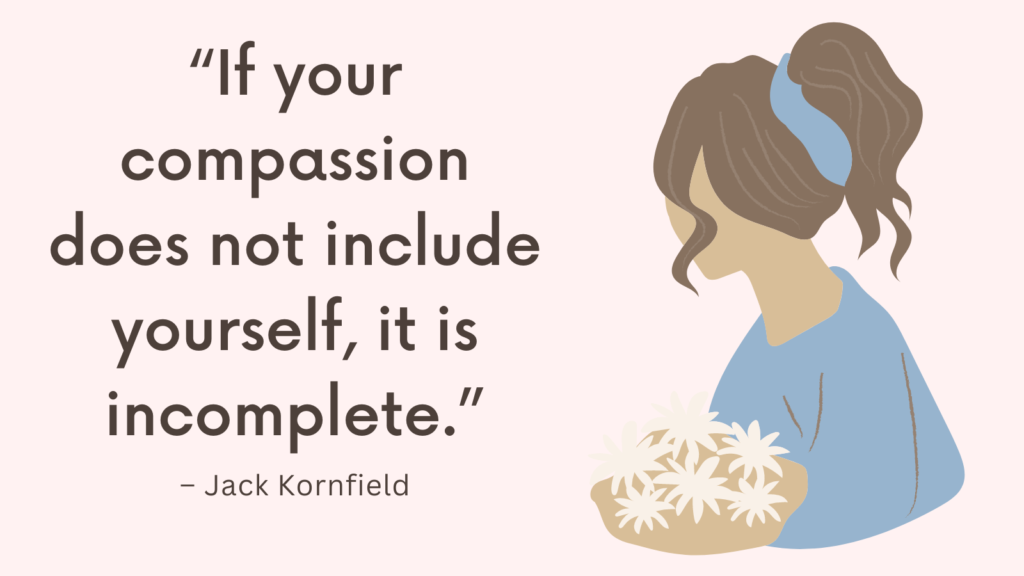Self-compassion isn’t about letting yourself off the hook—it’s about learning to treat yourself with the same kindness, patience, and understanding you offer others.
This post contains some of the best self-compassion journal prompts.
These journal prompts are designed to help you soften self-criticism, heal emotional wounds, and build a more gentle inner voice.
What Are Journal Prompts?
Journal prompts are writing prompts or questions that are designed to inspire and guide you in your journaling practice.
They provide a starting point for reflection, self-discovery, and creative expression.
Journal prompts can be simple questions like “What made you smile today?” or they can delve deeper into topics such as personal growth, relationships, or gratitude.
They are meant to spark your thoughts, encourage self-reflection, and help you gain insights into your emotions, thoughts, and experiences.
By using journal prompts, you can explore different aspects of your life, enhance your writing skills, and cultivate a deeper connection with yourself.
What Is Self-Compassion?
Self-compassion is not self-pity.
Self-compassion doesn’t mean you don’t hold yourself accountable.
Self-compassion is accepting and honoring your humanness, including your imperfections and the fact that we all make mistakes.
Self-compassion is treating yourself as you would a dear friend who is in pain.
Related: How To Start A Self Love Journey? Top 10 Powerful Ways to Love Yourself More
Dr. Kristin Neff, pioneer of self-compassion, identified 3 key elements of self-compassion (Source):
1. Self-kindness vs. Self-judgment.
Rather than criticizing ourselves when we suffer, we can practice being gentle with ourselves.
In the same way you’d comfort a dear friend who’s in pain, you extend compassion to yourself and show yourself kindness and understanding.
Self-Kindness Statements:
- It’s okay to feel this way.
- I’m doing my best and that’s good enough.
- I forgive myself.
2. Common humanity vs. Isolation.
Self-compassion entails recognizing that suffering is something that we all go through and that we’re not alone in our suffering.
Common Humanity Statements:
- I’m not alone in this.
- Everyone makes mistakes.
- I’m only human.
3. Mindfulness vs. Over-identification.
Self-compassion requires recognizing our suffering in a balanced way, rather than suppressing it or exaggerating it.
This means being able to observe our difficult emotions with openness and without judgment.
It also means seeing our situation in a larger perspective by relating personal experience to others who are also suffering.
Mindfulness Statements:
- I’m not my thoughts or emotions.
- I choose to be present with this feeling.
- My feelings don’t define me.
Self Compassion Journal Prompts
1. What do you need right now?
2. How would you like to feel today? What’s one thing you can do to cultivate this feeling?
3. Who in your life is nonjudgmental, safe, and genuinely have your best interest at heart? How can you spend more time with these people?
Related: Best 25 Journal Prompts For Self Love And Confidence Building
4. What emotions have you been having a hard time feeling lately?
5. What is one healthy thing you can so to uplift your mood when sad or stressed out?
6. What one self-care practice you can add to your routine to feel more joy or calm?
7. How can you be a nurturing parent to yourself?
8. What is preventing you from being compassionate to yourself? What is one small step you can take to overcome this obstacle?
9. What standards you have of yourself have you been pressuring yourself to meet? How can you adjust that standard to be more realistic?
10. What is one thing you can let go to create more space for rest and self-care?
11. What stressful circumstance are you currently experiencing? If you had a friend in the same situation, what advice would you give them?
Related: Top 23 Self Love Questions (+FREE Self-Love Resources)
12. If you loved yourself fully, how would you treat yourself every day? What’s one small step you can take towards that?
13. Did you recently make a mistake? What can you say to yourself show yourself more self-compassion?
14. What’s one important thing that you feel scared to do? How would a close friend encourage you to overcome that fear?
15. Are you holding a grudge against someone? What could you do to forgive and let go?
16. What is one thing you can forgive yourself for?
17. What in your life right now are you grateful for?
18. Write down a few self-compassion affirmations you can use when you need support.
The following are some examples:
- I accept the best and worst aspects of myself.
- It’s okay to make mistakes and forgive myself.
- I love and accept myself, even when anxious.
- I will treat myself with kindness and respect.
- I care about myself enough to want the best for me.
Related: Best 100 Self Care Affirmations To Honor Yourself
Self-Compassionate Statements PDF
Benefits of Using Self Compassion Journal Prompts
Here are some key advantages of incorporating self-compassion journal prompts into your daily routine:
1. Increased self-awareness: Journaling prompts encourage you to explore your thoughts, emotions, and experiences in a nonjudgmental way. This process helps you develop a deeper understanding of yourself, your patterns, and your needs.
2. Foster self-acceptance: By using self-compassion journal prompts, you learn to approach yourself with kindness and understanding. This practice cultivates a sense of self-acceptance, allowing you to embrace your imperfections and vulnerabilities.
3. Enhance self-compassion: Writing about challenges and setbacks with self-compassion prompts encourages you to treat yourself with empathy and compassion during difficult times. This helps you build a strong foundation of self-compassion, leading to improved emotional well-being.
4. Develop resilience: Self-compassion journal prompts promote resilience by helping you reframe negative experiences and setbacks. By emphasizing self-compassion, you can better cope with adversity, bounce back from failure, and navigate life’s challenges with greater ease.
5. Improve self-esteem: Regularly reflecting on self-compassion prompts allows you to acknowledge your successes, strengths, and achievements. Over time, this practice can boost your self-esteem and reinforce a positive self-image.
6. Reduce self-criticism: Journaling prompts focused on self-compassion help challenge and reduce self-critical thoughts. This shift from self-judgment to self-compassion fosters a healthier mindset and increases overall self-acceptance.
7. Enhance emotional regulation: Through self-compassionate journaling, you can develop better emotional regulation skills. Writing about challenging emotions allows you to process and understand them, leading to more effective coping strategies and a greater sense of emotional balance.
Related: Top 25 Self-Reflection Journal Prompts
How to Use Self Compassion Journal Prompts?
Using self-compassion journal prompts can be a powerful tool for cultivating self-acceptance, understanding, and kindness towards oneself.
Here’s how you can use them effectively:
1. Create a safe space: Find a quiet and comfortable place where you can concentrate without distractions. Make sure you feel relaxed and ready to reflect on your thoughts and feelings.
2. Set an intention: Begin by setting an intention for your journaling session. This can be a general intention of practicing self-compassion or a specific focus area you would like to explore.
3. Choose a prompt: Select a self-compassion journal prompt that resonates with you. It could be a question, statement, quote, or affirmation that encourages self-reflection and self-kindness.
4. Reflect and write: Take a few moments to ponder the prompt and let your thoughts and emotions flow naturally. Write down your responses without overthinking or worrying about grammar or spelling. Be honest and vulnerable with yourself but also remember to approach your thoughts and feelings with gentleness and non-judgment.
5. Explore and expand: After writing your initial response, dig deeper into your thoughts and feelings. Ask yourself why you think or feel a certain way and try to uncover any underlying beliefs or patterns. Challenge any negative or self-critical thoughts with self-compassionate alternatives.
6. Practice kindness: As you write, practice being kind and compassionate towards yourself. Offer words of encouragement, support, and understanding. Remind yourself that it’s okay to make mistakes and that you are deserving of love, care, and forgiveness.
7. Reflect and learn: Once you have finished writing, take a few moments to reflect on what you have discovered. Notice any patterns, insights, or new perspectives that emerged during the process. Consider how you can integrate self-compassion into your daily life.
Remember, self-compassion journaling is a personal practice, so feel free to adapt these steps to suit your needs and preferences.
Allow yourself time and patience as you explore and cultivate self-compassion through this process.
Related: Best 10 Self Discovery Books
Conclusion
Using self-compassion journal prompts can have numerous benefits for your well-being and personal growth.
By incorporating self-compassion journal prompts into your daily routine, you can experience these benefits and create a nurturing space for personal growth, self-reflection, and overall well-being.
References
- Self-compassion – Wikipedia
- Give Yourself a Break: The Power of Self-Compassion (hbr.org)
- Kristin Neff Argues Self Compassion Works Better Than Self Esteem – The Atlantic
- 15 Most Interesting Self Compassion Research Findings (positivepsychology.com)
- The Role of Self-Compassion in Development: A Healthier Way to Relate to Oneself – PMC (nih.gov)
- The influence of self-compassion on emotional well-being among early and older adolescent males and females – PMC (nih.gov)
- The Scientific Benefits of Self-Compassion – The Center for Compassion and Altruism Research and Education (stanford.edu)



